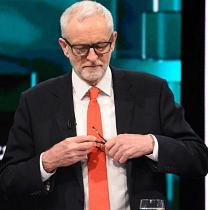Why Corbyn’s Agenda Does Not Translate to ‘Attack on Wealth Creation’
“Mainstream” economics does not appear to understand the functioning of the bourgeois economic order; and nowhere is this more evident than in matters relating to fiscal policy. It holds to this day that a fiscal deficit “crowds” out private investment by reducing private borrowing. This presupposes that there is a fixed pool of savings in the economy in any period, of which, if the government takes more (for meeting a fiscal deficit), then a correspondingly lesser amount is left for the private sector leading to a reduction in private investment.
The fallacy in this argument is that there is no fixed pool of savings; savings increase as the total gross domestic product (GDP) increases, and since the government expenditure that is financed by borrowing (a fiscal deficit) increases aggregate demand and hence, output and employment (a capitalist economy is demand-constrained except in times of war), the savings pool also increases with the fiscal deficit.
In fact, assuming for simplicity, in a closed economy with no foreign transactions, the savings pool keeps increasing until the excess of savings over investment in private hands exactly equals the fiscal deficit. A fiscal deficit, in other words, instead of taking resources from a fixed savings pool, “finances itself”, by enlarging the pool by an amount exactly equal to itself.
A similar fallacy is repeated by “mainstream” economics on the issue of taxing capitalists to finance government expenditure. If the government spends Rs 100 and raises the resources for it by taxing capitalists’ profits to the extent of Rs 100, then “mainstream” economics argues that capitalists’ profits go down by Rs 100. “Mainstream” economics, in other words, sees the entire process as follows: the government takes Rs 100 from profits, reducing post-tax profits by this amount, and then uses this sum for its own expenditure.
This, however, is completely wrong. If we continue assuming for simplicity that we are dealing with a closed economy with no foreign transactions (alternatively, we could assume both here and in the case discussed earlier that the current account deficit on the balance of payments does not change at all), and that the working people consume what they earn, then this entire process outlined above will leave post-tax profits completely unchanged compared with earlier, instead of reducing post-tax profits as “mainstream” economics believes.
The reason is simple. The government expenditure of Rs 100 raises aggregate demand and hence output and employment. But matters do not end there; this increase in output raises wages and profits in the sectors whose output increases, which in turn raises demand (for consumer goods) further, and hence output and employment further. Through such successive rounds of output increase, there will be an overall increase in pre-tax profits as well; and these rounds will continue until pre-tax profits have increased by an amount such that Rs 100 of tax on profits will leave post-tax profits exactly unchanged compared to earlier. Hence, the tax on profits, instead of reducing profits, leaves post-tax profits completely unchanged.



